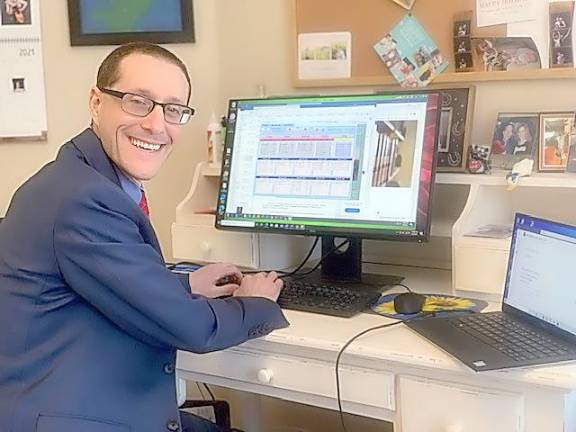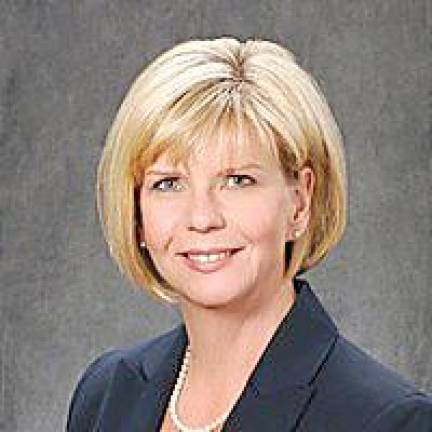The pandemic’s toll on children in need
Goshen. Children’s Rights Society adapts as COVID-19 limits to what these ‘zealot advocates’ can do for those encountering child abuse, neglect and foster care, custody and visitation, family offenses and orders of protection, juvenile delinquency, Persons in Need of Supervision and guardianship.



Attorney Adam Paltrowitz represents clients ranging in age from infancy to 21. Until recently, he could meet with his clients at the Children’s Rights Society headquarters in Goshen, a welcoming environment where he could build a trusting relationship during a stressful time for the kids.
“When we were having meetings in person, there were activities I would often do with a client while we talked,” he said. “For example, with my younger clients we would sit together and color a lot or play games. With an older client, I might throw them a stress ball or give them a fidget toy, which sometimes is helpful.”
With the pandemic, however, routines have changed drastically.
On March 16, 2020, the court system temporarily postponed non-emergency, non-essential in-person functions and began gearing up virtual representation. Chief Judge Janet DiFiore said in a recent message that the courts were making progress in resuming in-person activities, but the majority of court matters would continue to be handled virtually for the “foreseeable future.”
Karen Riley, executive director and chief attorney of the society, estimates that “99 percent” of its client interviews and court appearances are conducted remotely with cellphones, tablets or computers. The agency suspended in-person interviews in March 2020, resumed the sessions in late June but closed them again on Nov. 30.
Where the agency used to bring around 1,000 children into the office annually, in-person interviews are now scheduled only “in exceptional cases where we believe that the only way to have a completely private and open conversation with the child is to have them behind closed doors in our office,” Riley said.
“We are doing our job, but it is not optimal,” she added.
‘Kids are suffering’
Meanwhile, some “kids are suffering” educationally, also socially and emotionally from lack of social contact, and physically from lack of sports, play and exercise, she said. The lawyers have noticed during their virtual meetings more mental health issues among their clients, some of whom were in therapy before the pandemic even started.
Riley also worries that children may be facing greater risk from abuse and neglect due to their isolation. She cited the case of a 7-year-old boy who died recently in Newburgh in which police reported signs of neglect.
The numbers decline, but what does that mean?
Reports of maltreatment to the state hotline from Orange County plunged at the beginning of the pandemic because teachers and others who typically make reports were losing contact with kids. It is unlikely there was less abuse and neglect.
There were only 138 calls from Orange County in April 2020 and 201 the following month, compared to 257 in April 2019 and in 332 in May, according to a response to a Freedom of Information request from the state Office of Children and Family Services.
Reports have crept up recently, but October and November figures were still lower than those for the same months in 2019.
Zealous advocates
Nine Children’s Rights attorneys, assisted by three social workers and a bilingual aide, handle a wide range of matters in Family Court that include child abuse, neglect and foster care, custody and visitation, family offenses and orders of protection, juvenile delinquency, Persons in Need of Supervision (PINS) and guardianship.
Their services are free of charge without regard to income.
Paltrowitz and his colleagues are tasked with acting as zealous advocates for the positions of their child clients, just as they would in the case of adults. An attorney can substitute his or her own judgment of what would be best for the child only under very rare circumstances where the child might lack the capacity for good judgment or would put himself or herself in the imminent risk of serious harm.
The attorney for the child “listens, explains the law and procedures to the child, and appears in court to get the result the child feels is best for them,” according to the society’s website.
“Many of these kids have never had anybody care what they want,” said Riley, who recently won a Juvenile Justice Award from the state Women’s Bar Association.
Children’s Rights statistics reflect the turmoil of the last year in the courts. The legal services agency represented 4,470 children in 2019 but only 3,431 in 2020.
It had 1,217 custody and visitation cases in 2019, but that declined to 885 in 2020. Of those cases, 589 remained open, compared to only 157 unresolved cases at the end of 2019.
The number of abuse and neglect cases handled by Children’s Rights, issues the courts have tried to prioritize, actually rose. The agency handled 275 child protective matters in 2020, up from 217, but there were 187 cases still open at the end of 2020, compared to 30 at the end of 2019.
With schools closed, children regress
In addition to work in Family Court, the agency represents families who earn up to 200 percent of the federal poverty income ($53,000 for a family if four) on education law issues such as special education and discipline, mainly through negotiations and administrative hearings.
With schools closed for much of 2020, the education law case load fell to 96 from 226, said Ashley Saite, the program’s managing attorney, although it has begun to increase as children return to school.
Some parents of disabled children report “regression” if in-person schooling has been cut, she said.
State court statistics tell a similar story to those furnished by Children’s Rights. The number of abuse and neglect cases disposed of from March 1 to Dec. 18, 2020 in Orange County Family Court fell to 346 from 427 the previous year. Custody and visitation matters settled in Supreme and Family Courts declined to 306 in 2020 from 543, leaving a backlog of 1,697 in the two courts.
“It is taking longer to complete cases because the courts took a while to adjust to virtual proceedings, and it backed things up,” Riley said. “Again, I give the courts credit for everything they have done, but the conversion to virtual proceedings was an unforeseen circumstance.”
Riley estimated that Children’s Rights brought children into its office or the courthouse for confidential interviews with judges 12-15 times last year, compared to around 100 before the pandemic.
Interviews on camera, not in person
“The judges are meeting with the kids less frequently because the in camera (private) interviews generally happen in custody trials, and there are fewer custody trials right now,” she said. “They are so difficult to do virtually.”
The Children’s Rights attorneys have faced challenges in determining what stance its young clients want them to take in Family Court.
“We do lose something in virtual interviews,” Riley said, including all of a client’s body language. Some children don’t even want to show to their faces.
Benefits, because of virtual meetings
On the other hand, virtual appearances may benefit families who find it hard to travel to Goshen, she said.
Furthermore, Paltrowitz and his colleagues are no longer spending hours in the waiting room of Family Court, making it easier to schedule and freeing up more time for talk with clients.
Conversations between a lawyer and his or her client, whether child or adult, are confidential. In the virtual environment, The Children’s Rights personnel take extra precautions to ensure that a child is not being coached or that nobody is listening in.
“We need to interview clients in private,” said Valerie Davis, director of client services.
Clients often are living in close quarters with caregivers and siblings. Before conducting an interview, Davis stresses to parents and other caregivers why confidentiality is important and tells the client that “everything you say will be between you and me.”
She ascertains the communications platform that is available and how familiar the child is with it. She also scopes out the layout of the dwelling – does it have one or two floors? where is the child’s bedroom? and other features.
Some interviews are conducted from the bathroom.
Parents are usually cooperative, but Riley recounts one incident in which a mother who had been listening at the door fell into the room when the child opened it to return her cellphone.
The importance of establishing personal relationships
Paltrowitz is confident that he can do an effective job of representing his clients, even though he does most of his work out of a makeshift home office and doesn’t meet with them in person.
“I would not say that it’s necessarily difficult to establish a personal relationship communicating virtually. It’s just different,” he said. “It may take more time. It may take meeting with them more frequently at shorter durations because theirattention spans may sometimes be less virtually.”
All of his clients have his cellphone number.
“Some clients actually seem more comfortable meeting virtually,” he said. “They are in the comfort of their own home — often times in their own room where they feel safe and that works out really well. Everything is case by case, and we often have to adapt to specific situations, but that has always been the case in this line of work.”